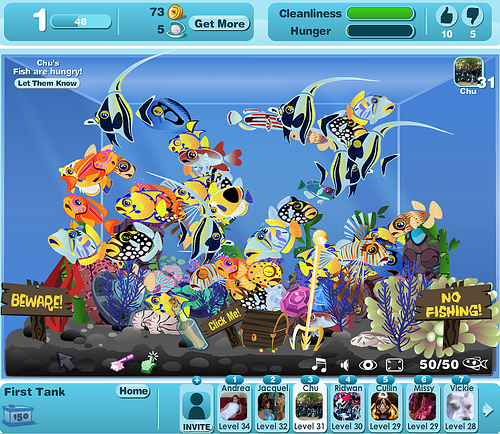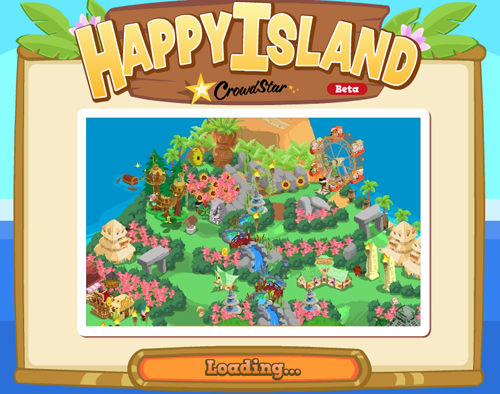人物专访:Crowdstar董事长谈公司社交游戏运营理念
众所周知,Crowdstar公司是顶级社交游戏开发商之一,曾推出《Happy Aquarium》、《Happy Pets》、《Happy Island》等著名的Facebook游戏,目前每月活跃用户是4700万人。
据游戏邦了解,Crowdstar与Playdom、Zynga等社交游戏开发商的运营理念略有不同,它实行精兵简政,力避冗员的策略,而且没有风险投资公司的支持,拥有完全独立的自主经营权。
该公司董事长Peter Relan表示,Crowdstar没有这种“预付款”的资助,反而会激发他们凭实力先赚钱的积极性,而不是寅吃卯粮,先砸下明天的钱去开疆拓界。这种运营模式,可以保证他们的业务发展免受风险投资者的干预。另外他还认为,开发社交游戏不能被掌机游戏的传统思维所牵绊。
以下是Peter Relan的访谈内容:
Crowdstar现在的团队规模是90到100人?你们还会继续扩充人员吗?有没有什么发展目标?
没错,Crowdstar现在有75到100人的团队就足够了,不过我们还会再招一些人手。估计明年我们的人员规模会扩大两倍甚至更多,但仍然会比Playfish、Playdom和Zynga的人员更少。
虽然我们人口少,却能吸引数量堪比Playfish、Zynga的游戏用户。所以我们会密切关注Zynga的动向,将它视为主要追赶目标。
我相信一个真正出色的开发者,他的能力抵得上五个,甚至十个普通人,这是我在硅谷呆了28年所总结出的一个真理。总体上讲,我认为一个Crowdstar成员的水平相当于其他公司五六个人的效率。
你们是怎么强调游戏质量的重要性呢?
Crowdstar对自己的游戏有一套严格的要求,也很重视聆听用户的反馈意见。这也是我们和其他公司不一样的地方,Zynga主要通过一个复杂的投票系统来搜集反馈信息,但我们的操作方式完全是公开化的,我们的产品信息透明度一直很高。
只要产品质量看起来或者感觉不对劲,我们就不会轻易将它推向市场。《Happy Aquarium》刚出炉时,我觉得它是一款很不错的产品,九月份发行了这款游戏后,它很快就通过Facebook的病毒式营销渠道形成了口碑传播效应,总之它就是一款很棒的游戏。
如果产品质量并不是那么过硬,用户也会把情况反馈给我们,而且我们还会将这些信息公之于众。可以说,我们对游戏质量的要求近乎吹毛求疵,如果它达不到理想的效果,对我们来说就是一件有失脸面的事情。
这个领域的企业并购很频繁,但你们公司仍然保持独身,将来是否会考虑并购?
Crowdstar的与众不同就在于,我们一直是独资企业,所以不需要去迎合投资者的取向。现在的这种运营状态还不错,应该会长期发展下去。坦率地讲,我们就是在享受工作乐趣,除非哪一天出于提高竞争力的考虑,或者认为这种运营模式已经难以为续了,我们才会考虑企业并购。
之前曾有传闻说微软打算收购Crowdstar,可是当时我们还只是一个仅有18人的小团队。我只想说这事挺有意思的,要知道传说微软打算花2亿美元收购我们的时候,Crowdstar的成员还不过15到20人而已。结果居然还有那么多人为了打探虚实,不停地挖掘小道消息。
是否认为Facebook关闭了病毒式营销渠道,对社交游戏的发展造成了很大影响?这一领域还会再出现像《FarmVille》这种规模的游戏吗?
过去两年,尤其是去年,可以说是社交游戏用户增长的全盛时期,而且这个机遇几乎是一生难逢,再也不可能有第二次。所以现在的问题就是,社交游戏用户的下一次爆炸性增长,究竟是哪年哪时?
我坚信Facebook仍是一个收益可观的平台,这一点是不容置疑的。对Crowdstar来说,我们是精锐部队,我们清楚这种形势,所以并没有陶醉于去年的成就。我们知道去年是特殊的一年,也明白怎样通过游击战方式争取用户。我们是唯一一家不依赖风险投资的游戏开发公司,所以我们从来不用花钱搞市场营销、抢夺用户。
我认为Zynga、Playfish和Playdom的运营方式差不多,他们规模都很庞大。如果是像他们这种条件的企业,就可以花2亿美元的风险资金,在Facebook上为自己广开门路,这种方式虽然在病毒式营销上占了优势,可声势一过就没有效果了。
对我们来说,病毒式营销确实是个好东西,我们一直致力于创建、使用更好的技术,开发出足以征服用户的社交游戏,病毒式营销也一样,不过它只是一个锦上添花的选项,我们从来不会把它作为自己的主打产品。
换句话说,如果你认为开发成功的开发社交游戏,唯一的手段就是广告轰炸,那就走岔道了。因为现在大家关心的是真正好玩的社交游戏,这也正是我们的游戏开发宗旨。
可否谈谈你们的设计理念,团队成员背景?有些社交游戏公司经常从传统掌机游戏领域挖角,就像Zynga聘请了Brian Reynolds一样……
他们确实经常从掌机游戏领域招人,掌机游戏开发者都很有才华……《FrontierVille》的确是一款非常棒的游戏。如果用娱乐公司来打个比方,Zynga就是类似于派拉蒙(Paramount)、环球影城(Universal Studios)的电影公司,那我们就是家庭影院(HBO)。我们其实更像是一个专门生产高质量、连续性内容的电视节目剧组,这种模式跟传统的掌机游戏领域截然相反。
我们整个公司只有两三个人是来自掌机游戏领域,他们刚来的头两个月,我们都会对他们进行“洗脑”、重新培训,让他们抛弃原来的那套固定思维模式。Facebook是一种网络文化,我们所运营的正是基于网络的社交游戏。
但是你不认为(那些掌机游戏开发者)久经考验的设计技术可以为你们团队注入一些新的开发元素?
Crowdstar游戏团队的领队人都不是原掌机游戏开发者。掌机游戏公司的运作方式就是,每个团队都有一个艺术总监、一个游戏设计总监,一个销售总监。
我们的游戏设计总监Jeff Tseng原来是Sega的成员,掌机领域的人才比较擅长把握游戏设置和游戏营收这两者之间的平衡,他们知道怎么设计一个有经济效益的项目,让游戏好玩同时又能持续运作。
我们当然需要这类人才,不过Jeff和那些只知道提出团队人员需求的高管不同,他并不需要负责人员招聘、资源整合、财务预算这类事情。(本文为游戏邦/gamerboom.com编译,转载请注明来源:游戏邦)
Interview: Crowdstar’s Relan On Facebook Success In A Post-Viral Age
Among the top-most companies in the social games space is Crowdstar, maker of Happy Aquarium, Happy Pets and Happy Island on Facebook, currently servicing around 47 million monthly users on the service.
Crowdstar sees itself a little differently from companies like Playdom and Zynga; as changes to viral channels continue to prompt evolutions in the way social game developers work, company chairman Peter Relan says the company was ready.
Crowdstar’s strategy has been to stay small. And according to Relan, the fact the company wasn’t founded with venture capital has meant an advantage in the way it operates.
In his view, firms established without big up-front dollars have to earn rather than buy their way onto the platform. And being private means no investors awaiting a certain level of return.
And amid much consolidation in the social space, Relan alludes to a rumor — widely reported regarding Crowdstar — that Microsoft once tried to buy the firm for $200 million in its early days.
Along the way, the exec talks to Gamasutra about Crowdstar’s rivals, how it’s stayed successful, and why it’s crucial to avoid console-like thinking in the social space.
You are at, what, around 90 to 100 people right now? Is the company going to keep growing? Is there a growth goal?
Yeah, we think 75 to 100 is about the right size for what we’ve accomplished. It’s lean and mean, but I think we will put some more muscle on. So, I would expect next year for the company to double or more in size, which would still be less than Playfish, Playdom, and Zynga. But, you know, we’re also bigger than Playfish and Zynga in terms of users. So, we expect to really focus on Zynga next round.
I believe that one great developer is worth five or ten others. That’s just been… I’ve been in Silicon Valley 28 years, and I’ve never seen that be disproven.
Generally speaking, I think one of our people here is equivalent to five people at anybody else’s company.
How do you iterate and address quality in your games?
There is a certain CrowdStar level bar, and our users will tell us. One of the things that you will see Crowdstar do differently than everybody else… [Zynga's] support is done through a trouble ticket system. Our support is done openly in the community. We’re like a glass house. So, we are completely transparent about our product.
Whenever our product quality, look, or feel doesn’t match up to what’s expected from Crowdstar… I mean, we set an incredible bar for ourselves, because when we launched Happy Aquarium… I mean, it’s a beautiful product. That went viral. You know, we launched in September. That went viral as much through word of mouth as it did using Facebook channels. So, it’s just a beautiful piece of art.
If a product’s not of that quality, users will tell us, and it will be out in the open with the community. And so we’re paranoid about being quality-conscious because otherwise we will be embarrassed.
Your company’s private, and there’s a lot of consolidation in the space. Do you see acquisition in your company’s future?
We’re unique because we do not have an investor base that is looking for a return, because we don’t have investors. [Laughs] The way I would describe our company is we will continue to build as long as we need to or want to. Frankly — we have a lot of fun doing what we do — until we decide we really should merge for reasons related to competitive dynamics or the business is not able to grow much more.
There was a rumor that Microsoft tried to buy us. We were 18 people at the time when that rumor surfaced. I can’t comment on that rumor, but when that rumor surfaced in February or March, for $200 million, we were 15 to 20 people. [laughs] So, a lot of people are digging it. If the rumor were true.
Do you think Facebook’s changes to its viral channels change the scope of what’s possible? Could there even be a FarmVille-sized game now?
The last two years, particularly last year, was a once in a lifetime, never to be repeated again probably in the history of any consumer product, sort of unbelievable opportunity to acquire hundreds of millions of users for free. And that won’t happen again. So, the question really is what are you comparing it next to?
I’m a big believer that Facebook is still a hugely beneficial platform, but one thing is for sure. That is a Crowdstar view because we’re lean, we’re mean, we understand… We didn’t get spoiled last year. We understand that last year was unusual. We still know how to guerrilla-market our way into getting users. We’re the only company that has been built without venture capital, which also means we’re the only company that has never spent money on market and gained userbase.
I think Zynga, Playfish, and Playdom are just like… They got fat, you know. You’ve got $200 million venture capital, buy your way on Facebook, you know, like, okay. They had that advantage of virality, but then virality was gone.
From our perspective, the virality was nice to have, but we were always building and using techniques that were truly social games that would get users anyway, and the virality was like, you know, whipped cream. But we never looked at whipped cream as our staple.
In other words, if the only way you know how to build social games is by spamming, yeah [laughs], that’s gone, right. So, now you have truly social games, and we believe we still build those.
Can you talk a little more about your approach to design, and your staff’s backgrounds? Some of the social game companies have been hiring talent from the traditional space, as Zynga did with Brian Reynolds…
They’re bringing in the console people. The console people are brilliant… FrontierVille was a very good game. That’s why I say… if you look at us as an
entertainment company, Zynga is like a movie studio. Zynga is like Paramount, Universal Studios. We are like HBO. We are like a TV show studio, where we regularly and continuously do productions that are quality, episodic, as opposed to… the old console model.
I would say we have two or three people in the whole company who come from console. And usually when they come here, we spend the first two months beating the crap out of them in terms of explaining that this is not that model. And Facebook is the same way. It’s a web culture. These games… We are running websites, basically.
But do you feel that it’s valuable that have learned time-tested design skills to come in and bring part of that equation to you guys?
Our game team leads are all non-console guys. But the game teams, the way they work is we have an art director, we have a game design director, right, and we have a merchandising director. They each put a person from their teams onto these teams.
So, we took our game design director, Jeff Tseng from Sega, because the mechanics and the key factors of monetization and economy balance… That is something that is very valuable from the console industry: how to design the economy, how to get the fun curve going, how to get the sawtooth going.
We absolutely need those guys. But there’s a difference between saying that person is running the studio with a mentality of… So, that person, Jeff, he’s not doing the staffing plans and the resourcing and the budgeting. That’s the people you want to avoid from the games… Because their natural mentality is “Alright. We need 40 people. That’s how we build a game, right?” (source:gamasutra)









































 闽公网安备35020302001549号
闽公网安备35020302001549号